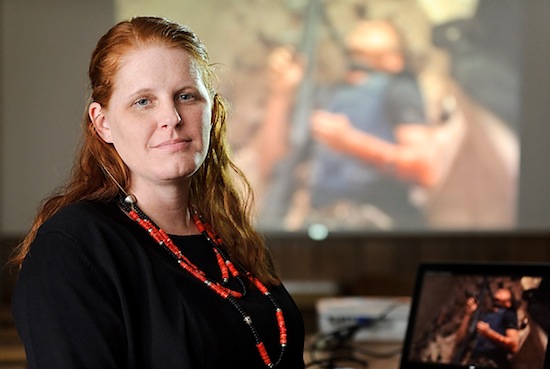Riddle’s childhood exposure to media violence informs her work

Karyn Riddle, pictured in front of a movie image, is studying whether safe people feel more fearful than is warranted because of their exposure to violence in the media.
Photo: Jeff Miller
Karyn Riddle remembers worrying as a child that she or her family would become victims of violent crime. Looking back now, she’s puzzled by those childhood fears.
“Why would I, living in a totally safe suburb, be anxious or think that the world is a violent place?” she asks.
An assistant professor in the School of Journalism and Mass Communication, Riddle is pursuing answers to that question in her research.
Riddle is trying to discover if, for some people, frequent exposure to violent media makes them generally more fearful — and if those violent thoughts become more easily accessible through regular viewing of violent movies, television or video games, or if limited exposure to hyper-violent media can trigger vivid, violent memories.
“The things that stay with you vividly in memory are things you rehearse a lot, things that are very emotional, whether the emotional experience is positive or negative,” Riddle says.
Riddle’s parents were avid watchers of local TV news in the Chicago area where she grew up, which featured news of violent crimes. She says her parents were strict about keeping her from watching programs with sexual content, but were not as vigilant about shows depicting violence.
“As a child I was anxious and had a big fear of crime despite living in a very safe place. I always wondered, is it because of the media and things I was watching?”
Karyn Riddle
Riddle didn’t start out her career intending to study media violence. As a high school student, she aspired to go into advertising, and majored in the subject at the University of Illinois. After graduation, Riddle moved to Chicago and spent five years with a large advertising firm.
She worked on national campaigns for major products, including some that targeted children. Ultimately the job left her feeling uninspired and disenchanted.
“The strategies we were coming up with to sell kids bad cereal didn’t make me feel good,” she says.
Riddle decided to head to the University of California, Santa Barbara for graduate school. There, she met a professor whose research focused on media and how it affects adults and children. She remembered her own experiences as a child, and the anxiety she felt about being the target of crime.
“That resonated with me because as a child I was anxious and had a big fear of crime despite living in a very safe place,” she says. “I always wondered, is it because of the media and things I was watching?”
After receiving her doctorate from UCSB, she came to UW–Madison and has sharpened her research into whether exposure to violent media makes one a more fearful, anxious person. Riddle recently conducted a national study on the effects of media violence.
Study subjects were asked how much they consume violent entertainment, and were also asked about how violent the world is today and whether they had been victims of crime.
“Those who watch a lot of violent movies and can recall it most vividly are the ones who overstate how much violence there is in the real world,” Riddle says of the findings.
It could be that watching a graphically violent movie is what makes a person more afraid, or it could be because they are already afraid they go to the types of movies that reinforce and validate their worldview, she says.
Riddle is also building a video-game research lab, and will help a graduate student explore whether playing multi-player video games competitively affects behavior differently than playing them cooperatively.
“What we know about violent video games and entertainment is that consuming them increases the likelihood of aggressiveness in the short term,” she says.
“I think people easily want to write it off as ‘I played video games as a kid and it didn’t affect me, so it shouldn’t be something we worry about.’ Everyone always thinks they’re invulnerable to these things.”
Riddle says there are many factors that may be at play in the appalling acts of horrific violence that have taken place over the last several years — mental illness, upbringing and access to weaponry among them. But she is trying to discover whether media consumption may also play some role.
“As a society we do have to think about the level of violence in our media and what it does to people,” she says.




